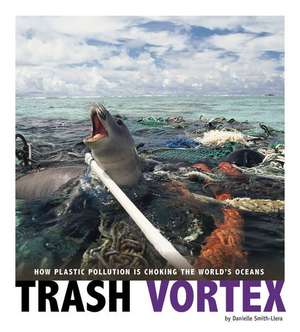Trash Vortex: CAPTURED SCIENCE HISTORY
Autor Danielle Smith-Lleraen Limba Engleză Paperback – 28 iun 2018 – vârsta de la 10 până la 14 ani
Preț: 57.71 lei
Nou
Puncte Express: 87
Preț estimativ în valută:
11.04€ • 11.56$ • 9.19£
11.04€ • 11.56$ • 9.19£
Carte disponibilă
Livrare economică 10-24 martie
Preluare comenzi: 021 569.72.76
Specificații
ISBN-13: 9780756557492
ISBN-10: 0756557496
Pagini: 64
Dimensiuni: 226 x 257 x 8 mm
Greutate: 0.23 kg
Editura: ROUNDHOUSE PUBLISHING GROUP
Seria CAPTURED SCIENCE HISTORY
ISBN-10: 0756557496
Pagini: 64
Dimensiuni: 226 x 257 x 8 mm
Greutate: 0.23 kg
Editura: ROUNDHOUSE PUBLISHING GROUP
Seria CAPTURED SCIENCE HISTORY
Notă biografică
Danielle Smith-Llera grew up in coastal Virginia, hearing unforgettable tales about her Mexican and Irish ancestors. She first moved overseas to teach in international schools in Hungary and Brazil. Life in the U.S. Foreign Service has taken her around the world to live in India, Jamaica, Romania, Belgium, the United Kingdom, and Washington, DC. She loves sharing stories--fiction, nonfiction, and a mixture of both--in classrooms, museum exhibits, and, of course, books.
Descriere
How Plastic Pollution is Choking the Worlds Oceans. Danielle Smith-Lleras former life as a teacher led her to write books for young people. She has taught literature, writing, history, and visual arts to students ranging from elementary school to college. Millions of tons of plastic slip into oceans every year. Some floats and travels slowly with the currents, endangering the health of marine animals. The rest is hardly visible but is far more dangerous. Tiny bits of plastic sprinkle the oceans surface or mix into the sandy seafloor and beaches. It ends up inside birds, fish, and other animals, harming them-and ultimately
